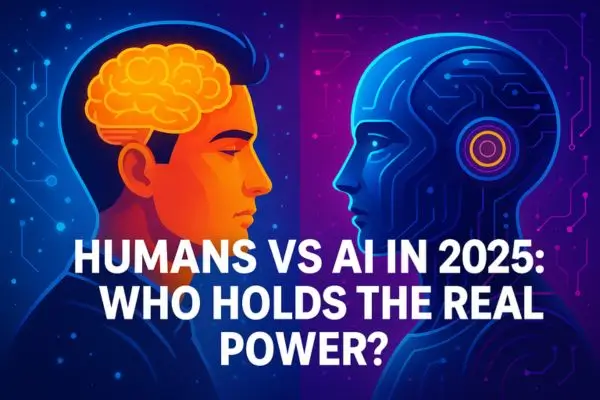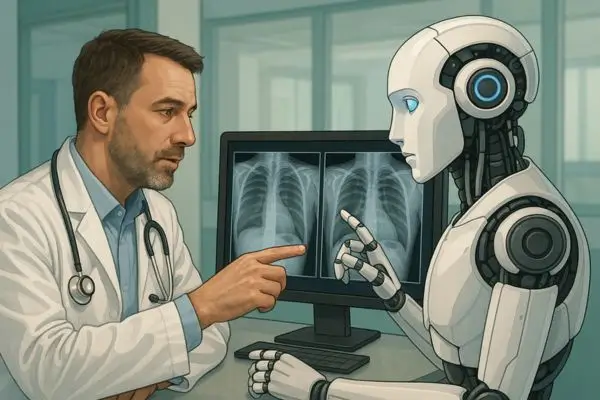What are the Key differences between human vs AI in 2025? Learn about their strengths, weaknesses, and how they can work together. We’ve been kinda obsessed with the whole human vs. machine thing, right? But it’s gotten real in the 21st century. We’re talking Siri, self-driving cars, and AI spitting out articles. Makes you wonder, doesn’t it? Can these fancy machines actually outsmart us? And if they can, are we heading for a sci-fi utopia or, you know, Skynet?
This article’s gonna dive into that very question. We’ll break down what makes our brains tick compared to the silicon kind. We’ll see where each one shines, and maybe even try to peek into the crystal ball and see what the future holds. Is AI just a souped-up calculator, or could it become the next evolutionary step? Let’s find out!
Topics Covered
Table of Contents
Human Intelligence: The Messy, Wonderful and Original
Human intelligence…where do you even start? It’s not just about crunching numbers. It’s this crazy cocktail of evolution, feelings, and everything we’ve learned along the way. It’s being able to think things through, come up with new ideas, and, crucially, adapt when things go sideways (which, let’s face it, they often do!).
Think about it:
- Feeling all the feels: We get empathy, joy, sadness…the whole rollercoaster.
- Knowing right from wrong (mostly): We grapple with ethics and make (hopefully) decent choices.
- Dreaming up stuff: We create art, music, and even, dare I say, interesting articles!
- Trusting our gut: That weird feeling you get? Sometimes it’s spot-on.
- Learning from screw-ups: We stumble, we fall, and we (hopefully) get back up wiser.
We connect with each other. We feel things, and that bleeds into everything we do. Good luck getting a robot to understand that.

What is Artificial Intelligence? The Shiny, Efficient Newcomer
It’s basically teaching machines to think, learn, and act sort of like us. It uses complicated recipes (algorithms) and mountains of data to mimic how we make decisions.
You’ve probably heard of some of the big players:
Machine Learning (ML): Where machines learn from data without being explicitly programmed.
Natural Language Processing (NLP): Giving computers the power of gab.
Computer Vision: Teaching machines to “see” and interpret images.
Generative AI (like ChatGPT): The stuff that writes text, creates art, etc.
AI’s killer app? Speed. It can chew through massive amounts of data faster than you can say “big data.” That makes it awesome for spotting trends, sniffing out fraud, and even helping doctors make diagnoses.
Key Differences Between Human Vs AI
| Feature/Skill | Human Intelligence | Artificial Intelligence |
| Learning Style | Experience-based | Data-driven |
| Emotions | Present | Absent or simulated |
| Speed of Thinking | Slower but thoughtful | Lightning-fast |
| Adaptability | High | Limited to data provided |
| Ethics & Morality | Complex and contextual | Pre-programmed |
| Creativity | Original and unpredictable | Pattern-based |
| Physical Needs | Needs rest, food, health | Operates 24/7 |
| Memory | Imperfect, emotional bias | Perfect (if data is correct) |
Human Brainpower: Where We Rule?
- Emotional intelligence:
We can read a room, understand body language, and know when someone needs a hug (or a firm talking-to). Our Emotional Intelligence helps us in relationship building.
- Moral Reasoning:
We can weigh the ethical implications of a decision and (usually) choose the right path. Human Intelligence can consider the emotional and social impact of a decision.
- Creativity:
We can come up with genuinely new ideas, invent things, and write that killer song. We can think outside the box But AI only searches the data that he has in his memory box.
- Intuition:
Sometimes, you just know. It’s hard to explain, but it’s powerful. We often make accurate decisions without complete information. This instinct is something AI still lacks.
AI: The Machine’s Strengths
- Speed Demon and Efficiency:
AI can process information faster than any human. It can process large data sets in seconds, but same data humans might take months to do.
- Pinpoint Accuracy:
Give it the right data, and AI can perform calculations with perfect precision. Its calculation accuracy is mind blowing, human can’t beat in this great feature of AI.
- Automation King:
AI can take over repetitive tasks, freeing us up for more interesting stuff. It improves productivity and reduce costs by completing boring repetitive tasks easily, without feeling bored and exhausted
- Never Gets Tired:
AI doesn’t need sleep or coffee. It just keeps going and going… AI don’t get tired or emotional. They can operate non-stop without finding excuses for leaves and rest.
Read our article about Al Learning
The Human Flaws: Our Limitations
Brain Drain: We get tired, stressed, and make dumb mistakes when we’re overworked.
Bias Alert: Our decisions are often influenced by our emotions and past experiences.
Memory…What Memory? Let’s face it, our memories are unreliable. We forgot things AH it’s a big Flaw. . .
AI’s Flaws: Where It Stumbles
Lack of Understanding: AI doesn’t truly understand context. It just sees patterns.
Garbage In, Garbage Out: If the data is bad, the AI will be too.
The Empathy Void: AI can’t build trust or connect with people on an emotional level.
Ethical Minefield: AI can be used for good or evil, and figuring out the difference is tricky.
Can AI Steal Our Jobs?
Can AI replace Human intelligence? AI can definitely outperform us at some tasks. Translating languages? Crunching numbers? No problem. But it still lacks the empathy, ethics, and real-world understanding that humans bring to the table.
Jobs where AI might replace a human:
Data entry
Customer service (routine questions)
Basic legal research
Jobs where humans are safe (for now!):
Therapists
Teachers
Artists
Social workers
The Real Takeaway: AI isn’t meant to replace us. It’s a tool to make us even better.
The Future: Friends or Foes?
- The Dream Team: Human-AI Collaboration
Humans and AI Working Together: Imagine a doctor using AI to analyze scans while providing the human touch. AI can analyze thousands of case studies in seconds, then the Doctor adds human judgment. This partnership can saves lives.

- Super humans: Enhanced Human Intelligence
Maybe we’ll even “upgrade” our brains with technology like Elon Musk’s Neuralink. This could make us more powerfull and super human.
- The Ethics and control:
As AI gets smarter and more advanced questions about its control becomes important, we need to figure out how to control it and make sure it’s used for good. People thinking about, who and how to control AI, who will decide what an AI should or should not do. Government and companies must establish ethical guidelines.
Timeline of AI Development:
2010: Smartphones and voice assistants become our new best friends.
2020: AI is everywhere, from chatbots to automated factories.
2023: Generative AI blows everyone’s minds.
2025: Humans and AI team up in healthcare, education, and business.
Final Thoughts: Harmony, Not Head-to-Head
Human intelligence is rich, emotional, and driven by our moral compass. AI is fast, logical, and tireless. Both have their strengths. Working together, they can achieve some truly amazing things.
The goal shouldn’t be to see which one is “smarter,” but how both can build a better world. So, let’s focus on how AI can serve us, not the other way around.
FAQs (Because Everyone Loves FAQs)
1. Will AI ever be smarter than humans?
Maybe in some ways, but it’ll always lack our emotional and creative abilities.
2. Can AI have emotions?
It can simulate them, but it doesn’t actually feel them.
3. Is my job toast?
Depends. If you do repetitive tasks, maybe. If you need empathy and creativity, you’re probably okay.
4. How do AI and human intelligence work together?
AI handles the data, and humans add the empathy and critical thinking.
5. What makes human intelligence special?
Our emotions, our moral compass, our creativity, and our gut instincts.
Pingback: 13 Big Limitations of AI: You Need to Understand AI Isn’t Perfect
Pingback: ChatGPT Review 2025 – A Fun Dive into AI's Best Buddy